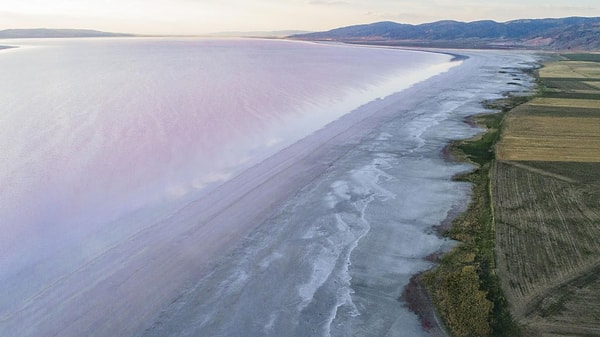Nestled in the heart of Central Anatolia, Turkey, lies an awe-inspiring natural wonder that captivates the senses and leaves visitors in absolute wonderment - Salt Lake. Also known as Tuz Gölü in Turkish, this mesmerizing saline lake is one of Turkey's most captivating destinations, offering a unique and unforgettable experience for those who venture to its shores. Salt Lake, responsible for meeting 70 percent of Turkey's salt requirements, holds a coveted spot on the UNESCO World Heritage Tentative List due to its exceptional natural formation. The presence of algae in the lake creates a distinct pink hue, offering visitors an unparalleled and unforgettable experience.
Salt Lake's Stunning Color Transformation: A Delight for Visitors

A Geological Marvel

Salt Lake is not your typical water body; it is a geological marvel that has been forming over thousands of years. Spanning approximately 1,665 square kilometers, the lake is Turkey's second-largest, and its immense white, crystalline surface evokes a lunar-like landscape. The lake owes its origin to the tectonic movements and volcanic activity that occurred in the region millions of years ago.
Fluctuating Water Levels

One of the most intriguing aspects of Salt Lake is its fluctuating water levels. During the dry season, the water evaporates, revealing vast stretches of crystallized salt formations, which make for an incredible sight. These natural salt terraces glisten under the sun, creating a surreal, almost otherworldly atmosphere. In the rainy season, the lake is transformed into a shallow, briny pool, attracting a diverse range of birdlife, including flamingos and pelicans, making it a paradise for birdwatchers.
Nature's Clever Defense
Salt Lake, fulfilling 70 percent of Turkey's salt demands, holds a significant position on the UNESCO World Heritage Tentative List due to its exceptional and distinctive natural formation. The algae present in the lake, which attracts numerous local and international tourists annually, adopts a clever self-defense mechanism during the summer months when temperatures and salinity levels rise.
Vibrant Transformations
It produces a red-colored substance called beta-carotene, shielding itself from the sun's harmful rays. As a result, the lake transforms into a striking pink or red hue, attributed to the excessive reproduction of halo bacteria during this period. Additionally, a substantial portion of Salt Lake's surface turns white as salt ascends to the top during the summer season.

